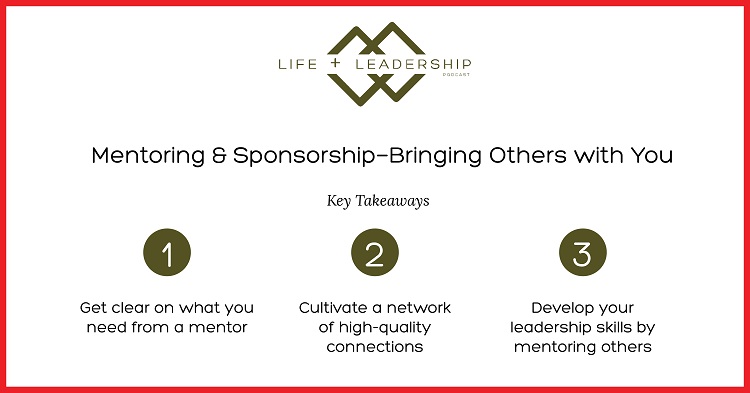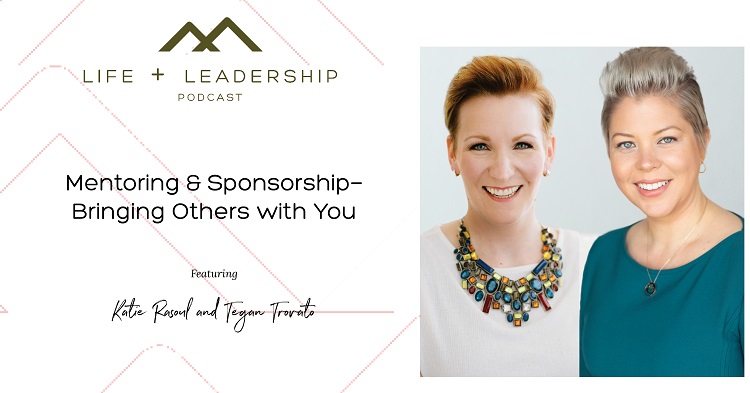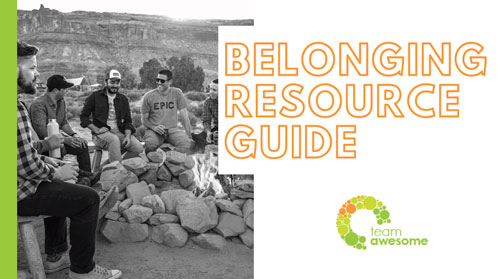We all need support and guidance in our personal and professional lives. But how do you build a network of people who will lift you up when you need it? How do you know if your current situation calls for a mentor, a sponsor or a coach? And what if you’re ready to BE an advocate for someone else?
Today on the podcast, we’re sharing the distinctions among mentoring, sponsorship and coaching and describing how to build a network of supporters who can solve any problem that might come up. We explore what makes an effective mentor and why it’s crucial to define what you want the mentoring relationship to look like.
We go on to discuss the connection between doing your job well and finding a sponsor who will advocate on your behalf. Listen in for insight on when it’s appropriate to seek help from a mentor, sponsor or coach and learn how YOU can benefit from being a champion for others.
Themes explored in this week’s episode:
- The distinctions among mentoring, coaching and sponsorship
- What an effective mentor looks like and why it’s important for mentees to be clear on what they need
- How to find mentors based on specific needs + how we each select and serve mentees
- The three primary types of mentorship—traditional, peer circles and reverse mentoring
- Why it’s crucial to agree on what you want the mentoring relationship to look like
- The relationship between doing your job well and finding a sponsor willing to advocate for you
- Keeping the person you sponsor top-of-mind and speaking up on their behalf
- When you might need a mentor, a sponsor or a coach
- How to build a network of supporters who can solve any problem that might come up

Resources from this episode:
- Watch this episode of the show on the Life & Leadership Podcast YouTube channel
- Read Tegan’s blog, ‘How the Gift of Mentorship Changed My Life’
- Learn ‘How to Be a Next-Level Mentor’ in Tegan’s Forbes article
- Explore Ed Batista’s piece on getting feedback in Harvard Business Review
- Find out ‘How to Get the Feedback You Need’ in Carolyn O’Hara’s HBR article
- Learn more about reverse mentoring in this New York Times piece
- Understand how coaches, mentors and sponsors differ via this Catalyst infographic
- And just for fun, listen to Michael Bolton’s hit song, “Soul Provider”
We would love to hear from you! Have an idea for a podcast or a question you want us to address? Interested in additional support, resources and workshops? Here are all the ways you can interact with us!
- Tweet us! @tegantrovato and @TeamAwesomeMKE
- Email us: tegan@BrightArrowCoaching.com and Katie@TeamAwesomeCoaching.com
- Follow us on Facebook @BrightArrowCoaching and @TeamAwesomeCoaching
- Follow us on Instagram @TeganTrovato and @katie_rasoul
- Connect with us on LinkedIn: Tegan Trovato and Katie Rasoul
- Download free tools and sign up for our newsletters, events and workshops by visiting: https://www.brightarrowcoaching.com/ and https://www.teamawesomecoaching.com/
Quotes from the episode:
Tegan—
“If we really want to diversify leadership in our organizations, then multiple people to be looking for the opportunity to open the doors for those talented folks who are underrepresented at work.”
“It really is on us as a mentee to be clear on what we need.”
“Do I see myself in you enough that I know I have something to offer you that’s going to further your own trajectory?”
“Don’t sign up for more than you have to give. The short story is, don’t be a half-ass mentor.”
“Think about it as part of YOUR leadership development to BE a mentor. You will grow being reminded of all these lessons you have up your sleeve.”
“I needed a coach when I wasn’t clear on where I was trying to go and sometimes even on how I wanted to get there or why it was important.”
“My personal belief is we’re all here to lift each other up … and mentoring and sponsorship are two beautiful ways to do that.”
Katie—
“The best [mentors] always gave me the space to do my thing.”
“My best mentors just clearly cared about me as a person, and our relationship was built on each other rather than our positions or our titles.”
“You have to do your job well, period. Nobody’s going to put their name on you without certainty that you’re going to knock it out of the park.”
“You have to be crystal clear about your goals and share them with your sponsor because if you don’t even know what your goals are or where you’re going, it’s very difficult for someone to accurately advocate on your behalf when you’re not in the room.”
“[I need] sponsorship when I have a goal that needs some sort of power or influence or referral behind it.”
“If I think of my network now… literally any problem could be solved with the people who are a phone call away from me.”
“What is one thing you could do this month to be of service to someone else as a mentor or sponsor?”



Recent Comments